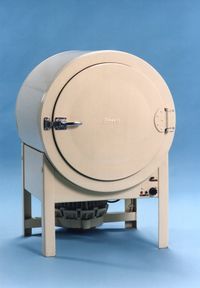BSH Chronology 1979-1983: National Growth
The relatively short period between 1979 and 1983 was a phase of national growth for BSHG[1]. The consolidation of BSHG in the 1970s bore fruit and the company managed to effectively maintain a foothold in the market despite the economic crisis and even expand its own position.
Drop in revenue at BSHG – "The kitchen is full"
An article appeared in the German magazine "Der Spiegel" in 1982, entitled: "Die Küche ist voll. Die Hausgeräte-Hersteller stecken in einer schweren Flaute," which roughly translates as "The kitchen is full. Home appliance manufacturers experiencing serious downturn."[2] The negative effects of the second oil crisis from 1979/1980 were being clearly felt at the start of the 1980s.[3] 1982 in particular was a very difficult year for the German economy: High unemployment, rising energy prices and a decline in real income also impacted the home appliance industry.[4] High interest rates and the slow pace of housing construction were the final straw, the home appliance boom of the early years was definitely over.[5] Refrigerators, washing machines and vacuum cleaners were already standard appliances in more than 90 percent of all Federal German households in 1982, leaving only the meager business with replacement units. Added to this, excess capacities existed in production: according to estimates, 15 to 20 percent more food processors were manufactured than sold in Europe at the beginning of the 1980s.
Concentration and efficiency
BSHG managed to maintain its position despite the difficult times; and held a market share of 16 percent in Germany in 1982. This put the company in second place behind AEG.[6] The streamlining of production in the 1970s proved worthwhile. Unlike the competition, BSHG concentrated its production in four factories. Each of these sites meanwhile specialized in specific product groups. Revenue increases of between 3 and 11 percent were recorded annually between 1979 and 1983.[7] BSHG launched its internal HR and social report in 1979, providing information on measures such as advanced education and training or occupational and health safety.[8]
High-quality technology
The BSHG brand products were presented at the time under the motto "Future-proof appliances that are a pleasure to use".[9] 1983 was also a year when BSHG celebrated an impressive anniversary: 50 years of electrical refrigerators from Bosch essentially equated to 50 years of experience and progressive development of the appliances. The BSHG washing machines were also becoming increasingly modern and efficient. Siemens launched the first fully automatic washing machine on the market with the SIWAMAT 870 Electronic.
NEFF
Competitor and market leader AEG went spectacularly bankrupt around the middle of 1982. The then Board of Management of AEG set about trying to restructure the company by selling off the lucrative parts.[10] This allowed BSHG to expand its portfolio with the addition of the familiar NEFF brand. Neff Werke GmbH, a subsidiary of AEG, had the reputation of being a manufacturer of high-quality home appliances.[11] On November 15, 1982, BSHG acquired the NEFF trademark as well as a portion of the fixed and current assets including the sales subsidiaries in England, France and Austria and founded what is today NEFF GmbH in Munich. Around 1,000 jobs were successfully retained at the Neff site in Bretten.[12] New sales channels opened up for BSHG, with Great Britain being one of the most significant. NEFF also brought with it specialized technical knowledge and innovations in product development.[13]
Notes
- ↑ BSH was founded in 1967 as Bosch-Siemens Hausgeräte GmbH - BSHG for short. In 1998, the name was changed to BSH Bosch und Siemens Hausgeräte GmbH, with the short form BSH. Since the sale of the Siemens shares in BSH to Robert Bosch GmbH the company’s name is now BSH Hausgeräte GmbH, but still BSH for short.
- ↑ "Die Küche ist voll", in: Der Spiegel 31/1982, page 61.
- ↑ BSH Corporate Archives, A01-0001, Business Report 1980, page 4. Business Report 1981, page 4.
- ↑ "Die Küche ist voll", in: Der Spiegel 31/1982, page 61; Dieter Speermann: Deutschland – Die Dritte Industrielle Revolution, München 2010, page 80.
- ↑ "Ja, wenn wir ein Saftladen wären", in: Der Spiegel 34/1982, page 27.
- ↑ "Die Küche ist voll", in: Der Spiegel 31/1982, page 61.
- ↑ BSH Corporate Archives, A01-0001 to 0007, Business Reports 1979–1987, page 4 in each case.
- ↑ BSH Corporate Archives, B07-0346, Personal-, Sozial- und Bildungswesen Bericht 1979; BSH Environmental Report 2001, page 27.
- ↑ BSH Corporate Archives, A05-0005, inform 1982/1, page 2.
- ↑ "Das Geschäft bricht weg", in: Der Spiegel 27/1982, page 69.
- ↑ BSH Corporate Archives, F-Neff-005, Gabriele Kicherer: Geschichte und Bedeutung der Marke Neff, page 54. "Ja, wenn wir ein Saftladen wären", in: Der Spiegel 34/1982, page 27.
- ↑ BSH Corporate Archives, Historie Tochtermann Folder 5.
- ↑ BSH Corporate Archives, F-BSH-001, 40 Jahre BSH – Eine Chronik, Munich 2007, page 39.

